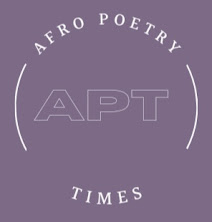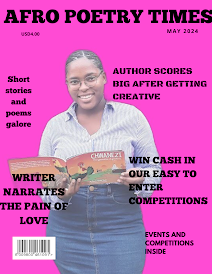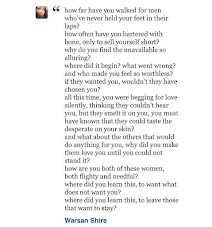Saturday, February 19, 2022
LSU becomes new home of Most Important Private Collection of African American Poetry
Friday, February 18, 2022
Poet uses the power of poetry to tackle climate change in Africa
“As there has been talk around climate change (mainly about the change in climate patterns), I decided to encourage artists to talk about it since it is in line with sustainable development goals,” he said.
Mtatabikwa said it was crucial for people to know more about climate change issues to bring positive change in the manner people treat the environment.
“There are a lot of things we are experiencing because of climate change. These include change in weather patterns, pollution and heatwaves.
“If people can embrace different forms of art, they will surely embrace our mission to educate them on environmental issues through art.”
Apart from using art to educate people about climate change, Mtatabikwa said he had embarked on a treeplanting programme.
Financial support for writers
Details: Peggy Ramsay Foundation, 7 Savoy Court, London WC2R 0EX;
email: prf@harbottle.com; website: www.peggyramsayfoundation.org/ grant-applications.html
Thursday, February 17, 2022
Zimbabwean poet Hope Masike launches erotic poetry book
Sensational afro jazz artist Hope Masike launched her second poetry book collection titled Dzevabvazera last Friday at Theatre in the Park in Harare just in time to give lovers the perfect Valentine’s Day gift.
The poems are sizzling hot and deeply sensual, which celebrate the art of lovemaking and creatively interrogates love and sexuality in an environment of complete creative freedom. It also explores the healing and liberating power of love in its sensual and spiritual manifestations.
The launch was fused with a live music concert and book reading and also featured as guest performer, veteran township jazz crooner Tanga wekwa Sando, and a poetry recital by Fadzai Katanda.The book has 14 steamy poems written in Shona with a brief overview in English which Masike recited accompanied by mbira music fused with the rattling sound of the hosho (shakers) and contemporary musical instruments comprising a set of alto and soprano saxophones.
Nominated for the Kora AllAfrica Music Awards in 2016, Masike looked stunning in hoop earrings, a tight fitting décolleté outfit that had a design of the iconic fertility symbol, the chevron motif, flowing down from her waist to the hem of her dark red dress.Sex and sexual education is largely taboo in Zimbabwe and by launching the book, Masike has set the pace for discussion since sexual topics are rarely addressed in the public realm.
Writing erotica as a genre is equally perceived as risky yet historically erotic poetry has a very long tradition and is renowned in African cosmology and just like a lot of our customs, it is one of those values that is gradually disappearing.
Story teller and author of Chibarabada, Tinashe Muchuri, said Dzevabvazera is a “reprimand giving hope in fighting the challenges that ruin happiness between lovers. The feared things have found a bold writer who has named them succinctly with depth as we relax and laugh while healing some of the challenges found in love”.
On why she chose erotic expressions in her second book, Masike said: “I wanted something different; I wanted to capture a theme that is not often spoken of. The book was born out of inspiration from a book that I was given by my friend the late jazz musician, Friday Mbirimi, titled How to Write Erotica, a book that I got deeply immersed in during the pandemic.”
Through music, lyric and metaphors Masike and her band took the crowd on an enticing and tantalising initiation into the riches and beauty of this venerable poetic tradition as she paired her outstanding vocals with experimental literature themed around sexual knowledge, evoking vivid sexual imagery giving fans who braved the rain an opportunity to ponder on how joyful and gratifying sex can and should be.
Call for submissions - Whose Pleasure Is It Anyway?
They seek work which ‘firmly places pleasure at the centre of their aesthetics, poetics, or politics’. They like submissions ‘that laugh, tickle, and shriek in the face of frivolity’.
Website: www.canthius.com
Award winning South African poet is looking for African poems
“I believe that African poets have voices that also need to be heard through their creation.”
A mental health advocate and founder of Feed A Mind Foundation, Mthimkulu said one has to stay authentic to own writing and not get confused.
“I used to face challenges of being authentic with my writings. As poets we get exposed to other poets and their writing styles, as there are styles of writing as a poet you will love that are different from yours,” she said.
Her work has been featured in a global mental health awareness anthology titled Letting in the Light.
“I have been published on FunDza Literacy Trust and my Poem-on-Poem Hunters has received a four-star rating on Amazon,” she said.
“I am also the founder of My Mental Health Global Programme which got me nominated for the Global Start Up Awards 2021 and MAMA Best Movement Nominee 2021/22.”
Away from writing, Mthimkulu, who is a psychotherapist by profession, is involved in pageantry and she was recently crowned Miss Lejweleputswa 2021 finalist.
Living in a woman’s body: Mama’s War – an original poem
In her latest work, the South African actor and writer Lebogang Mashile tackles the exploitation and sexism faced by Black women
Mama’s War
Mama’s gone viral
Mama’s screen shuffles faster
Than hashtags invented by Black women
Who turn tech into culture daily
Boardrooms and bedrooms are battlefields
What’s today’s share price for Mama
Mama’s the only profitable stock
Mama’s baby is five years old, mining coltan in Congo
Mama’s foster children’s root chakras never healed
Mama’s who George Floyd called out to
When home is a dangerous place
How does Mama lockdown?
When home is a dangerous place
How does Mama lockdown?
They pushed Mama into government for the numbers
Mama’s a brand ambassador with diplomatic impunity
Mama’s on the evening news talking like a man now
Mama calls it power moves
Mama’s war is the ocean
The refuse in Mama’s belly
The money in Mama’s mouth
The melting ice caps releasing variants
Mama’s heating up
Mama’s a pissed off hellscape
Mama’s asking what do you do when a child star explodes?
Mama’s last born is on YouTube suckling data
To feed the family
Mama wonders why bell hooks never saw 70 and how Winnie couldn’t live at least as long as Nelson
Mama is Shailja Patel, Assata Shakur, Stella Nyanzi, and Mona Eltahawy writing on the edge of the blade
Mama plays hopscotch on national borders
Mama is ungovernable terrain
Mama is death’s favourite lover
Mama is Henrietta Lacks’s blood in vaccines they won’t share
Mama’s comorbidities are 4C hair, commodified fertility, and soil so rich Mama can’t own it
Mama’s working extra shifts to buy herself back
Mama’s in her overdraft paying antiBlack tax
Mama’s talking to the therapist in her mind
About Auschwitz, Amazon and Palestine
Mama’s work keeps everyone alive
But they won’t call Mama a genius
They made Mama famous
And acted like it was a substitute
For being free
Atlas, what do you know
About carrying the world
Mama’s war makes
Myths out of men
Life from man’s rib
Lies from men’s pens
So that we would never gaze
Into Mama
And call her
God
Lebogang Mashile is an actor, writer and poet
































